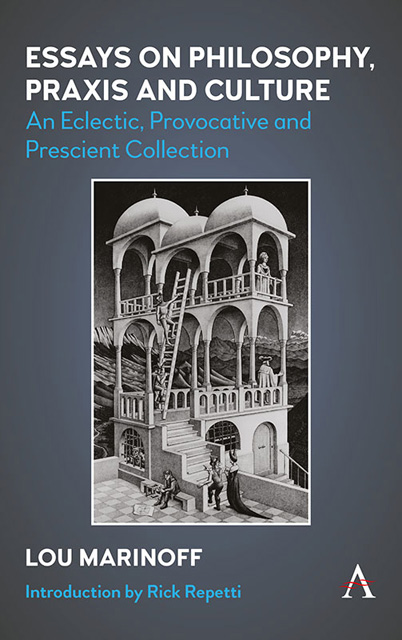Essay #16 - Humanities Therapy as a Remedy for the Detriments of Technosociety
Published online by Cambridge University Press: 10 January 2023
Summary
This essay was originally read as a keynote lecture at the International Conference on Humanities Therapy in Technosociety, in Nanjing, China, August 2019, whose theme was Bridging the Gap between Science and Humanity.
It was originally published as Lou Marinoff, “Humanities Therapy as a Remedy for the Detriments of Technosociety,” Keynote Address at the ICHTT at Nanjing University, Journal of Humanities Therapy 10, no. 2 (2019): 1–19.
It is republished here by permission of the Journal of Humanities Therapy.
Introduction
Globalization and the digital revolution are transforming human civilization in unprecedented ways, in large measure via innovation as well as imposition of emergent technologies on growing numbers of consumers. While these transformations confer undeniable benefits to humanity, the benefits are bundled with a corresponding set of detriments. This essay does not contest the benefits but confronts the detriments. It appeals to humanities therapy as a remedy for many of the cognate problems experienced by individuals and societies alike, problems that stem from overexposure to technologies and underexposure to humanities.
What do we mean by “Technosociety”?
First, we need to distinguish between technocracy and technosociety. A technocracy is a society governed by elites whose expertise is primarily technological. A technosociety is a society governed by a received political system but whose daily personal, social, economic, and cultural transactions are mediated by intervening or imposed technologies. Prime examples of such technologies are clustered in an acronym known as “The FANG”: Facebook, Amazon, Netflix, and Google. In addition to and beyond these, it is increasingly impossible to conduct any kind of personal, social, economic, or cultural transaction without engaging with one or more digital devices, interfaces, and networks. Thus, the fundamental process of human-to-human interaction has been supplanted by one of technologically mediated interactions. This is what we mean by “technosociety.” That said, however, the demarcation between technocracy and technosociety may not be as impermeable as implied by the foregoing distinction. Since governments themselves depend on emergent information technologies no less than their citizens, one can envision cybernetic power struggles that could transform salient dimensions of technosociety into technocracy itself.
“The Two Cultures”
Since the theme of this ICHTT is “bridging the gap” between sciences and the humanities, it is germane to inquire into the nature of the gap itself.
- Type
- Chapter
- Information
- Essays on Philosophy, Praxis and CultureAn Eclectic, Provocative and Prescient Collection, pp. 305 - 318Publisher: Anthem PressPrint publication year: 2022

